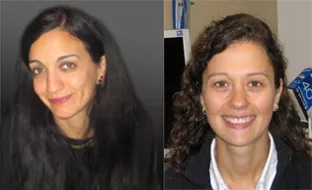
CIHR awards to support research in child behaviour, disease-related proteins
The innovative health research of two University of Toronto Mississauga professors has been recognized with prestigious New Investigator Awards from the Canadian Institutes for Health Research (CIHR).
Tina Malti, assistant professor in the Department of Psychology and Voula Kanelis, assistant professor in the Department of Chemical and Physical Sciences, will each receive funding of $60,000 per year for five years.
“The award is a tremendous honour, and will make a huge difference in the amount of time I’m able to spend on my research,” says Malti.
Malti runs the Laboratory for Adaptive Development and Emotions in Children and Youth, which focuses on children’s and adolescents’ mental health, moral and social emotions – such as empathy, guilt and anger – and developmental psychopathology.
“With the CIHR funding, my research team will be investigating the role moral emotions play in children’s aggressive behaviour,” says Malti. “We’ll also be examining how children with aggressive behaviour respond, both emotionally and physiologically, to moral conflict situations, such as taking turns versus excluding other children.”
With the research, Malti hopes to produce reliable and timely empirical data about some of the causes of aggressive behaviour. “We recognize that moral emotions play an influential role in how children resolve conflicts about rules and obligations,” she says. “This knowledge is likely to contribute to the development of new, early intervention strategies to reduce aggression in children, such as targeting moral emotions and the regulation of physiological arousal.”
For Kanelis, the award will have intangible benefits that reach beyond the research itself. “The purpose of the award is to allow a researcher to spend more time in the laboratory. This means more time training students and post-doctoral fellows, which enhances the training experience, and more time having the informal discussions that are essential for generating ideas that advance and inform the research.”
With her team, Kanelis will be examining a protein—which she refers to as a “biological machine” due to its complexity—that is responsible for transporting potassium out of the cell. There are two types of the protein involved in creating the channel through which the potassium moves: one forms the pore in the membrane while the other controls the opening and closing of the pore.
“The channel is found in cells of the heart, brain and pancreas, so if it doesn’t function correctly, it causes a whole host of diseases,” says Kanelis. “These can include diabetes, diseases from too much insulin, or a variety of cardiovascular disorders.”
Kanelis will be running experiments to analyze the 3-D shape of the protein, how the shape is altered by disease-causing mutations, and how drugs bind to the protein. “There are many drugs on the market that are supposed to act on this channel, but it’s not clear how they work,” she says. Her team will also examine the ways in which new therapeutics interact with the potassium channel.
Although Kanelis will be focusing on the cardiovascular specific form of the protein, findings will be applicable to the similar diabetes-specific protein.
The CIHR New Investigator Award provides early career researchers with the opportunity to develop and demonstrate their independence in initiating and conducting health research through the provision of a contribution to their salary. Only 40 awards were given in this funding round.
"Our professors have consistently demonstrated that their work is of the highest calibre, in terms of the quality, scope and impact of their research," says Professor Deep Saini, Vice-President, U of T and Principal, U of T Mississauga. "The CIHR New Investigator Awards confirm U of T Mississauga's position as a leader in health sciences research."
